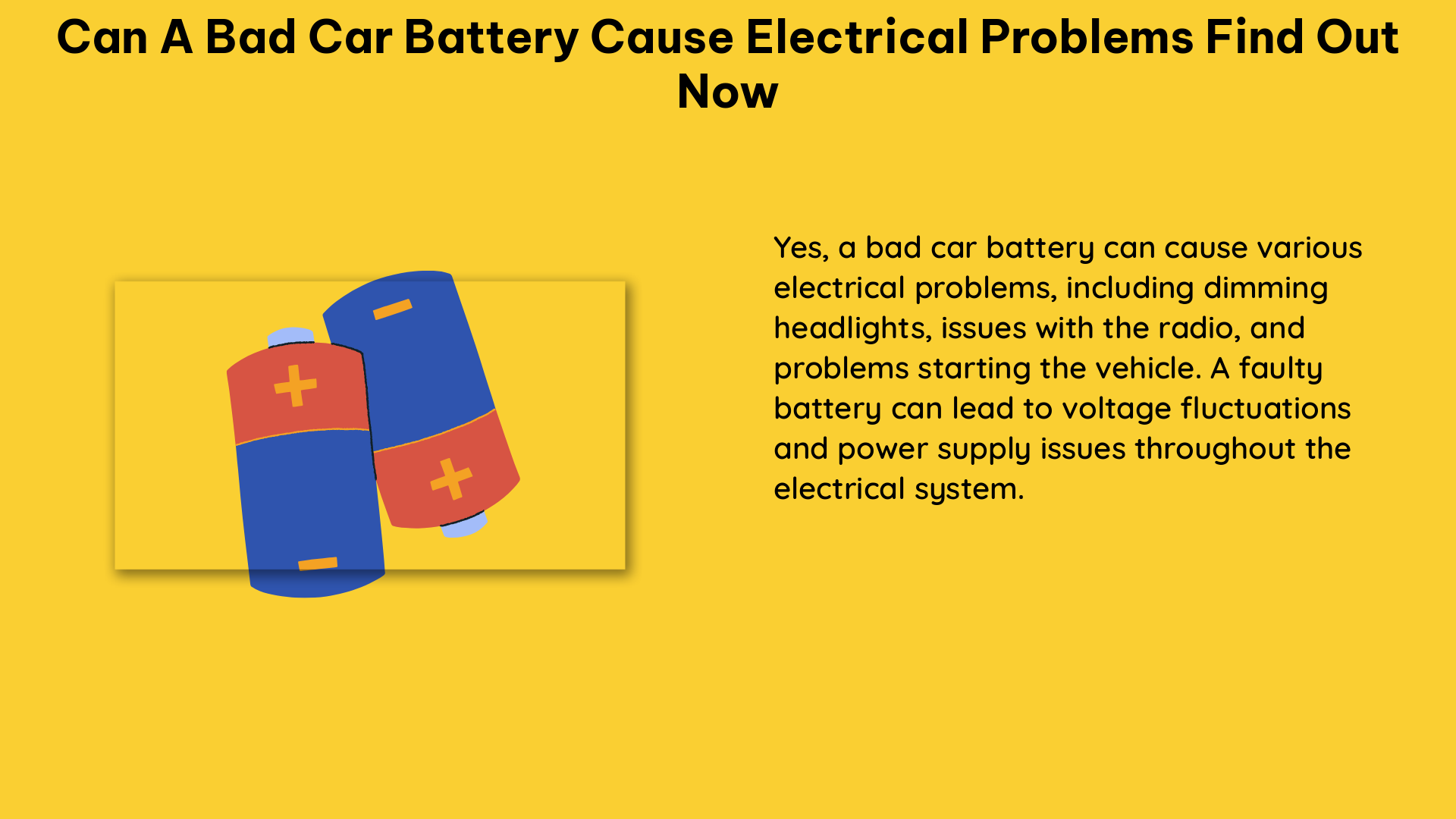A bad car battery can indeed cause a variety of electrical problems in a vehicle, affecting the performance and functionality of various systems. Understanding the impact of a faulty battery on a car’s electrical components is crucial for identifying and resolving these issues.
The Role of the Car Battery
The car battery is responsible for two primary functions: starting the engine and powering the vehicle’s electrical systems while the engine is running. It provides the necessary voltage and current to start the engine and then maintains the electrical charge required to operate the various electronic components in the car.
How a Bad Battery Can Cause Electrical Problems

- Insufficient Power Delivery: When a battery is underperforming or failing, it may not be able to provide the necessary voltage and current to power the vehicle’s electrical systems. This can lead to various malfunctions, such as:
- Dim or flickering headlights
- Erratic behavior of the car’s infotainment system or dashboard displays
-
Intermittent failure of power windows, power locks, or other electrical accessories
-
Alternator and Starter Issues: The battery’s voltage directly affects the performance of the alternator and starter. If the battery is weak or faulty, it can cause the alternator to work harder to maintain the electrical charge, potentially leading to premature alternator failure. Similarly, a bad battery can strain the starter, making it more difficult to start the engine.
-
Computer and Electronic Control Unit (ECU) Problems: The car’s computer systems, including the powertrain control module (PCM), rely on a stable power supply from the battery. A bad battery can cause these electronic components to malfunction, leading to issues such as:
- Check engine light illumination
- Erratic engine performance or misfiring
-
Transmission problems due to insufficient voltage
-
Transmission Issues: In some cases, a weak battery can cause transmission problems by not providing enough voltage to the transmission control module (TCM). This can result in delayed gear shifts, erratic shifting, or even transmission failure.
-
Electrical Accessory Malfunctions: Electrical accessories, such as power windows, power seats, and the audio system, require a consistent power supply from the battery. If the battery is underperforming, these accessories may not function correctly or may experience intermittent issues.
Diagnosing and Addressing Battery-Related Electrical Problems
To determine if a bad battery is the root cause of electrical problems, it is recommended to have the vehicle tested by a professional auto repair shop or a parts store. They can perform the following tests:
-
Battery Load Test: This test measures the battery’s ability to deliver the required current under load, which simulates the demands of the vehicle’s electrical system.
-
Voltage Test: A voltage test checks the battery’s voltage, both at rest and under load, to ensure it is within the recommended range.
-
Cold Cranking Amps (CCA) Test: The CCA test measures the battery’s ability to start the engine in cold weather conditions, which is an important indicator of the battery’s overall health.
-
Alternator and Starter Tests: The repair shop can also test the alternator and starter to ensure they are functioning correctly and not contributing to the electrical problems.
If the battery is identified as the root cause of the electrical issues, it should be replaced with a new, high-quality battery that meets the vehicle manufacturer’s specifications. This can help restore the proper power supply and resolve the electrical problems.
Preventive Maintenance
To avoid battery-related electrical problems, it is essential to maintain the car’s battery and electrical system properly. This includes:
- Regularly cleaning the battery terminals to ensure a good connection
- Checking the battery’s charge level and replacing it if it is not holding a charge
- Inspecting the alternator and starter for proper operation
- Monitoring the vehicle’s electrical accessories and addressing any issues promptly
By understanding the impact of a bad car battery on the electrical system and taking proactive steps to maintain the battery and related components, you can help prevent and resolve electrical problems in your vehicle.
References:
- Car Battery, Alternator, and Starter: How They Work Together
- Bad Battery Problems: What to Look For
- Can a Dead or Bad Battery Cause a Check Engine Light and Limp Mode?

The lambdageeks.com Core SME Team is a group of experienced subject matter experts from diverse scientific and technical fields including Physics, Chemistry, Technology,Electronics & Electrical Engineering, Automotive, Mechanical Engineering. Our team collaborates to create high-quality, well-researched articles on a wide range of science and technology topics for the lambdageeks.com website.
All Our Senior SME are having more than 7 Years of experience in the respective fields . They are either Working Industry Professionals or assocaited With different Universities. Refer Our Authors Page to get to know About our Core SMEs.